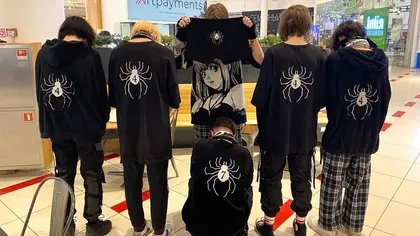They’re young, wear distinctive anime-inspired hoodies, spark mass-brawls in public places and in just a couple of weeks have already spooked authorities in both Ukraine and Russia. They claim to be members of PMC Ryodan but insist they are “just a regular group of teenagers”.
Russia says they’re a creation of “Western intelligence services”. Ukraine says they’re an “informational-psychological operation” organized by the Kremlin in order to “destabilize the internal situation in Ukraine.”
JOIN US ON TELEGRAM
Follow our coverage of the war on the @Kyivpost_official.
So, what’s the truth? Let’s examine the phenomena.
PMC stands for “private military company”, the most notorious of which is the Wagner mercenary group fighting for Russia against Ukraine. In reality PMC Ryodan is not an actual PMC but appears to have adopted the name “ironically” though, for obvious reasons, it has the authorities both in Ukraine and Russia a bit spooked.
Who are they?
Clearly that depends on who you ask but, essentially, PMC Ryodan are informal groups of youngsters with a shared love of the Japanese Manga Anime series "Hunter x Hunter", the plot of which features the criminal organization "Geney Redan". As well as long black hair, members of PMC Ryodan often wear checkered trousers and hoodies featuring spider logos and the number 4, as worn by the Geney Redan gang members

Putin and Xi Praise Ties, Hours After Trump Sworn In
Where did the group originate?
Bizarrely, given the war in Ukraine, the group originated in Russia, just a couple of weeks ago but has since quickly spread to Ukraine. PMC Ryodan first gained attention on February 19 when some 30 people were arrested following a mass brawl between its members and other youths in the food court of the Aviapark shopping center in Moscow. A few days later a similar brawl erupted in St. Petersburg’s Galeria shopping mall, leading to 131 arrests.
What about in Ukraine?
The first gatherings of PMC Ryodan were reported in Kharkiv on February 27 and then the following day in Kyiv. Followers were also reported in Zhytomyr, Lviv, Ivano-Frankivsk, Bila Tserkva, Cherkasy. Ukrainian police have detained more than 200 teenagers linked to the group and blocked at least 18 social media channels and groups where information about the gatherings were distributed.
How much of a threat are they?
Authorities in both Russia and Ukraine are taking the apparent threat very seriously indeed.
Kremlin spokesperson Dmitry Peskov said the group was a “pseudo-subculture” that “brings no good for our youth”, while praising the mass arrests already made. Russia has pointed the finger at the West, claiming the group is directed by “unfriendly countries” and they would be “closely monitored”.
Vasily Piskarev, chairman of the State Duma Committee on security and anti-corruption, noted that law enforcement agencies should "study the situation in detail. It is necessary to find out whether representatives of unfriendly countries are behind the new ‘fashionable structure’, whose sole goal is to destabilize the situation through our youth".
Meanwhile, Ukrainian authorities insist the group are directed by the Kremlin. A Kyiv police spokesman said "Provoking mass fights among young people and teenagers is an attempt by Russian propagandists to conduct another information and psychological operation and use children to destabilize the internal situation in Ukraine".
Who’s right?
Probably neither. It’s more likely it’s just a bunch of kids hanging out and getting into trouble.
One PMC Ryodan member interviewed by Sever.Realii, said: “We are a gathering of teenagers who go to concerts and take walks together. We have common interests and an ‘alternative’ appearance. The brawl in Aviapark [shopping mall] was an accident. Our acquaintances were harassed by a young guy because of their appearance. We didn’t provoke anyone at all, we are just a regular group of teenagers.”
As for the cross-border spread of the phenomenon blogger and Japanese language teacher Borys Moroz believes that Ukrainian children imitate the Russian subculture despite a full-scale invasion due to the desire to escape from the harsh reality of life in war-torn Ukraine.
"The Ukrainian anime community has been concentrating only on war for a year now,” he explained. “Then the Russian band “Ryodan” appears and offers an idea that helps you immerse yourself in romantic pre-war life. The choice for a 14-year-old person from Ivano-Frankivsk or Poltava is clear here.”
You can also highlight the text and press Ctrl + Enter










